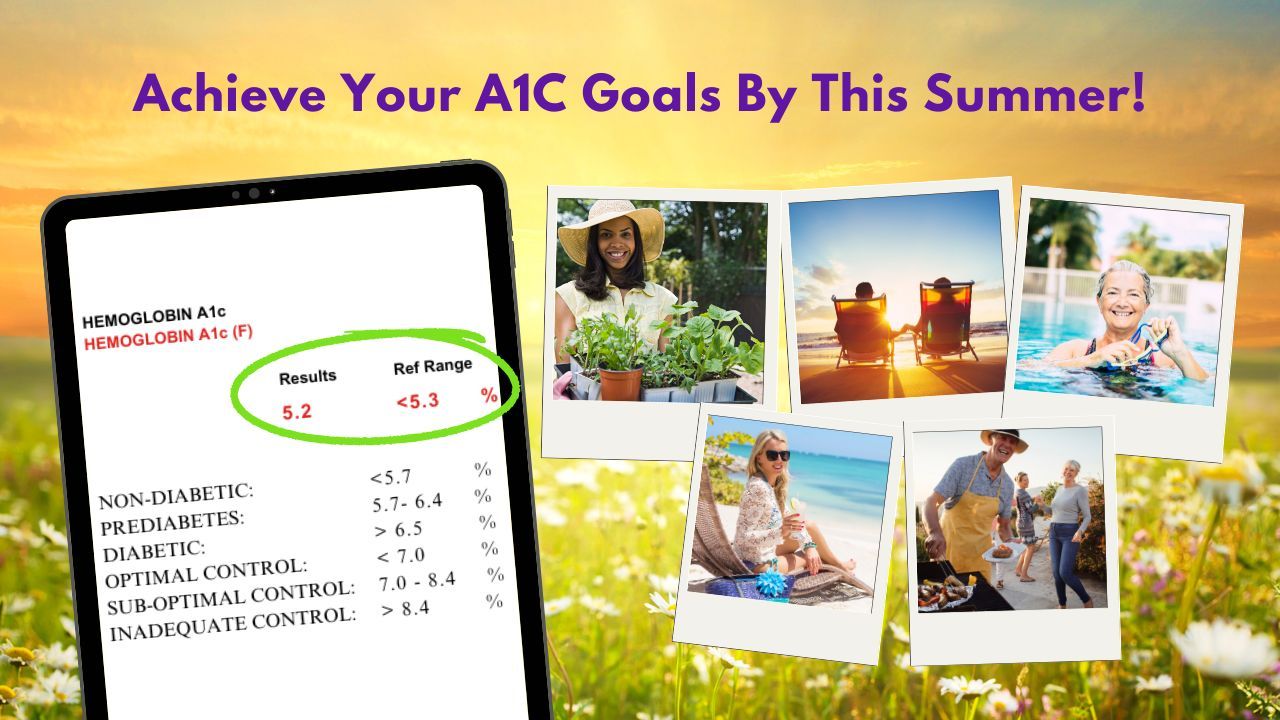
Achieving Your A1C Goal By This Summer: Mini Steps Towards Successful Diabetes Management
Imagine how it would feel waking up every morning feeling like you had the best sleep ever, are full of energy, and when you look at your blood sugar numbers, you see that they are in the healthy target range. Imagine how confident you would feel if you knew exactly what you had to do to achieve your targeted blood sugar goals, with no stress and no guesswork. That's exactly what you can expect when you take the proven action mini steps listed below, that will cumulatively lead you to your ultimate A1C target goal.
Setting and achieving targeted blood sugar goals can help eliminate stress and guesswork in managing diabetes and lead to new levels of diabetes health …and improved diabetes health also equals improvements in all areas of your life: your relationships, productivity, energy levels, healing, and overall vitality. Health is truly the most valuable gift we hold, and that’s why, in this blog post, I’ll be providing tips for winning with proven A1C mini goals.
Before we begin, it’s important to first understand a few basics about A1C tests, results and goals:
What’s An A1C Test?
An A1C test is a blood test that shows the average of your blood glucose levels, for the past 3 months. The results are important as they can give you an indication of how well you are managing your blood sugar levels.
Your A1C scores are a benchmark on if what you’re doing for your diabetes health is working. Think of your A1C score like the ultimate scorecard of the results of your commitment to doing everything you can to achieve your best diabetes results and living a vibrant diabetes life.
What’s The A1C Goal For Diabetic Patients?
Your A1C target will depend on a few factors. For most people with diabetes, healthy A1C target goals range from 6.5% to just below 7%. Your personal target goal; however, is something your wellness coach or healthcare professional can help you determine, depending upon your unique circumstances and age.
Factors That Can Affect A1C Test Results
Although A1C tests are an excellent standard to measure how much glucose is attached to the haemoglobin in your blood, A1C results can be affected by a few things including other medications you are on or other illnesses or diseases you may have.
Can A1C Results Go Up And Down?
This is a question I get asked a lot, and the answer is yes, but that doesn’t necessarily need to be alarming. As mentioned above, your A1C is the current benchmark for your overall blood sugar management. As your numbers go up or down, use those numbers as guidelines to educate yourself on what you can be doing more or less of. So for example, everything from your eating patterns, activities and stress levels prior to your test, could influence your results.
Reasons Why A1C Levels Go Up
Some reasons your A1C may be higher than on your previous tests include: if you haven’t been getting good quality or sufficient sleep, if your stress levels have increased or if you have excessive or deficient vitamin and mineral levels, to name just a few. However, as mentioned above, things like illness and injury can also cause your A1C scores to rise, so it’s very important to go over your test results and comparisons with a certified wellness professional who can help you pinpoint the cause(s) of the higher score.
Creating Your A1C Mini Goals To Arrive At Your Ultimate A1C Target Goal
Now that you understand A1C basics, I’d like to emphasize that a number of factors affect A1C results – and the good news is that you have control over most of the factors. So let’s go ahead and create some A1C mini goals that will help you achieve your ultimate A1C power goal.
A1C Mini Goal #1:
I will keep a tracking journal and commit to regularly monitoring my blood sugars.
Since there are many things that can influence your A1C results, a DAILY tracking journal will help you monitor and track your blood sugars and help you identify what caused your blood sugar spikes. Once you can determine these triggers, you can work your way towards lowering and balancing them. This is also imperative to share with your diabetes coach and health care team. Your daily tracking journal includes things like the foods you ate, if you overeat or undereat or if you skipped meals. It can also include things like your level of activity for the day, what medications you took, how much water you drank, how well you slept, stressors, if you were feeling well or if you felt ill, and anything else your diabetes coach and healthcare team advised you to track.
A1C Mini Goal #2:
I will explore and practice new ways to lower my A1C.
You are likely doing the basics for your diabetes self-care, such as being aware of the amount of sugar you are eating, managing your food portions, and so on, but it doesn't end there. There are dozens of things you can do to achieve better overall blood sugar health naturally and holistically. Take time to learn about these new strategies and resources you can trust and then take *ACTION to implement these new principles. You should then carefully track and assess what is working for you in your tracking journal. (*please be sure to first discuss any changes you do with your diabetes medical professional).
A1C Mini Goal #3:
I will make conscious choices about the foods that help me achieve optimal blood sugar levels and eat more of those.
You can start with a small step like adding 1-2 extra vegetables to your salad, soup or stir-fry, adding berries to your breakfast plate, or swapping out junk food for healthier options such as a handful of nuts. The good news is that the more diabetes-friendly foods you include in your diet, the less you will crave or fall into old habits of grabbing sugar or trans-fat filled foods and drinks.
A1C Mini Goal #4:
I will spice up my life
Luckily, there are a variety of food add-ons that can greatly impact your overall blood sugar health. Start with cinnamon – a powerful and tasty spice that can help lower blood sugar levels and increase insulin sensitivity. You can add cinnamon to your chia pudding, your diabetes-friendly muffins, oatmeal, coffee or tea, or even try it in squash soup, chilli or a delicious Moroccan chicken.
A1C Mini Goal #5:
I will take time for me.
This is one of my favourite holistic diabetes self-care goals because in this hectic and unpredictable world, scheduling in time for you is the best way to assure you are getting a healing mental and physical break. A great place to start is by learning what effective breath work is and how to do it. Breath “therapy” will help you lower your stress (critical when you have diabetes), help you focus, help to balance your blood pressure and so much more. Breath work is easy to do and it's free. Simply check out a free meditation class or find one of many videos on how to practice breath work on YouTube. Get started with breath work today and record the difference it makes on your stress levels, sleep, blood sugar levels and overall health!
A1C Mini Goal #6:
I will shake things up.
There’s one law from high school physics I’ll never forget: An object in motion, stays
in motion. That means that once you move, it will be easier to keep moving. So for this goal, take just a few steps or do just a few movements to get you going, and then increase from there. You can go for a short walk to start and then progress from 10 minutes to 20 and then 30 minutes or a full hike. Try a few dance moves and then progress to a full Zumba class. Enjoy movement and make it fun and invite a friend to join you so that you stay more committed. The important lesson here is to just get started. Soon, getting in a minimum of 20 - 30 minutes of movement each day will be a breeze and help positively impact your blood sugar levels. Now that’s a great reward!
A1C Mini Goal #7:
I will add supplements for healing and health.
Studies have shown that our soil nowadays has far less minerals and overall nutrients than in the past. That means that you may have deficiencies you’re not even aware of! Consider adding supplements to your diet. Luckily there are supplements that are excellent for overall diabetes health. I suggest starting with magnesium. Not only will magnesium help lower stress and help with sleep, but It can improve circulation and even insulin resistance.
Magnesium Tips:
Be sure to take magnesium with food to improve absorption. Also note that taking magnesium at the same time you take prescribed medications such as metformin is not recommended, unless your medical professional advises you otherwise. Please ask your diabetes healthcare team for the best type of magnesium supplement for you and how much is appropriate for you.
Make This Summer Your Healthiest A1C Goal Achievement Yet!
You just learned a few key tricks on creating and setting powerful A1C mini goals. By monitoring your blood sugar, eating more diabetes-friendly foods, getting more movement into your days, tracking your progress, and staying positive, you can work towards improving your A1C target goal by this summer!
Remember that managing diabetes is a journey, and it's important to celebrate your successes along the way. By following these self-care practices, you can start taking control of your diabetes, have more energy and feel better than ever.
It’s now time for you to put some of these goals into action and commit to doing everything you can to score your healthiest diabetes empowered summer yet!
For even more action steps you can take to transform your blood sugar success and overall diabetes health, come join our Facebook group:
YES! I want to join the free Diabetes Facebook Group
Wishing you vibrant health, healing and happiness this summer and throughout the year.
___________________________________________
ABOUT THE AUTHOR

Dr. Ac., C.H., RDH
Dr. Holistic Studies, Dr. Acupuncture
Diabetes Wellness Strategist & Coach
Creator & CEO of Holistic Diabetes Solutions
8 X International Best-Selling Author
As a woman living with diabetes for over 30 years, Dr. Cheryl understands the journey firsthand. When she was diagnosed, she received the same outdated advice her grandmother was given for over four decades, who relied primarily on medication, suffered from deteriorating health and eventually lost her life to diabetes. Fueled by this experience, Dr. Cheryl was compelled to seek a better way. Through countless research studies and trials, she developed the winning holistic approach: the Diabetes Success System which merges traditional wisdom with today’s best holistic self-care practices. It has revolutionized diabetes management by providing a trusted way to maintain consistent and predictable healthy blood sugar levels. Join the thousands of people worldwide who have been empowered by Dr. Cheryl's approach and start living your healthiest life.
_______________________
PROFESSIONAL DISCLAIMER
The material and content contained in this platform is for overall general diabetes health and education information only. It is not intended to constitute medical advice or to be a substitution for professional medical recommendations, diagnosis or treatment. All specific medical questions or changes you make to your medication and/or lifestyle should be discussed and addressed with your primary healthcare provider. Having the right mindset, doing the right movements at the right times of day, and eating foods that help keep blood sugar, insulin, and inflammation manageable can dramatically reduce your risk of the all-too-common complications of Diabetes, increase your energy levels and have you feeling your best every day.






